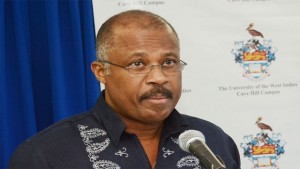 BRIDGETOWN, Barbados, Monday May 30, 2016 – The University of the West Indies (UWI) has launched an appeal for financial support from alumni, friends and donor agencies, as well as the private and public sectors across the region.
BRIDGETOWN, Barbados, Monday May 30, 2016 – The University of the West Indies (UWI) has launched an appeal for financial support from alumni, friends and donor agencies, as well as the private and public sectors across the region.
Scheduled to run from August 1 to 7 under the theme “Emancipate, Educate, Donate”, the UWI Global Giving Week marks the beginning of a tradition that will see graduates making an annual contribution to their alma mater, according to the university. At the launch, Vice Chancellor Professor Sir Hilary Beckles, said that although regional governments have played their part in empowering the institution over the years, many are now urging the university to reduce its dependence on the public purse.
The university’s finance committee shows that the contribution from regional governments has dropped significantly from 80 percent of the total operational budget 15 to 20 years ago, to 45 percent today, Sir Hilary disclosed. He added that there has not been a systematic approach “to reach out to those we have created and those who we have empowered and those who have done very well in this region and in the world beyond.
“This giving week, then, is an attempt to say to our graduates all over the region and the world, to friends of higher education, to friends of the cause of research, public policy formulation, promotion of entrepreneurship, all of those who do believe not only in the empowerment of young people through education, but those who are committed to the further development of this region, to come to the aid of your university at this stage,” he said.
Speaking in support of the campaign, former Barbados Prime Minister Owen Arthur, who is also a former UWI student and lecturer, said that investment in the university is needed now more than at any other time in the Caribbean’s history. “We are about to live in a new global society, a new global economy where conventional factors of material production, land, labour, capital are yielding to the new imperative of technology, knowledge and entrepreneurship.
“The new economy, the new society, will be a learning society and it behoves us to be able to act today to make sure that our university and our society cease to function in the 20th century and come fully into the new society that is to be the 21st. The governments alone cannot do it,” Arthur said. The former prime minister cautioned that the Caribbean is destined to fail in the absence of determination and resolve to convert the region into a new learning society and economy.
